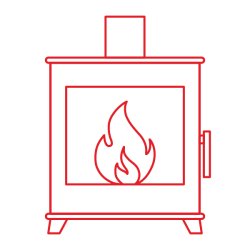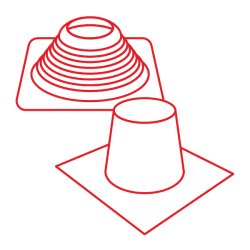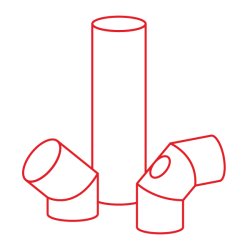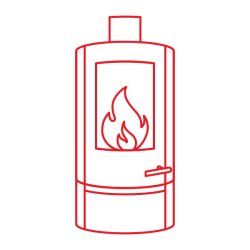Warming to the Benefits of Pellet Stoves
News Categories
By Year
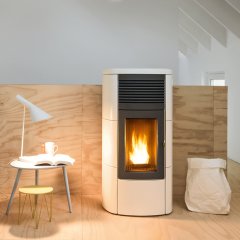
As Britain continues to appreciate the advantages of traditional wood burning stoves, Ian Sams explains how pellet stoves can offer an even more efficient alternative.
Conventional wood burning stoves offer a host of powerful benefits to householders. They are reliable, reduce heating bills, use a renewable fuel source, and new EcoDesign Ready models are particularly energy efficient and clean burning compared with older incarnations.
One perceived drawback is that although you can regulate their air flow and heat output to a limited amount, you can’t simply switch them on and off, or expect instant heat.
That’s where pellet stoves come in. Pellet stoves burn compressed wood or biomass pellets to create a source of heat. By slowly feeding fuel automatically from the storage container (the hopper) into the burn tray, a constant flame is created and monitored to ensure maximum efficiency.
Pellet stove users have far greater control over the amount of combustion that occurs because, unlike wood burners, their burners modulate up and down depending on demand. They are also ‘heat-on-demand’ appliances just like gas boilers. The upshot is that they are the best way to get truly controllable heat from wood.
Indeed, probably the biggest benefit of pellet stove is its ease of use thanks to automatic ignition, power modulation and the fact that these stoves can be programmed.
Pellet stoves are also even more energy efficient than wood burners – more than 90% efficient, in fact. There are essentially two reasons for this – they burn renewable fuel (small pellets that typically measure between ⅜ and 1in in length, comprising a mix of sawdust, wood chips, bark, and other materials from plants) and they emit a relatively low level of airborne particulates.
The University of Manchester SUPERGEN Bioenergy Hub (www.supergen-bioenergy.net) aims to bring together industry, academia and other stakeholders to focus on research challenges associated with delivering sustainable bioenergy systems.
Its director, Professor Patricia Thornley, says biomass appliances (which include pellet stoves) can deliver substantial reductions in carbon emissions and that, although wood stoves do release carbon and particulates, in the context of what the fuels they are replacing produce, they may still offer a significant net benefit.
She said recently: “Biomass heating [which typically uses wood pellets or wood chips as fuel] is a technology available today that can immediately reduce the greenhouse gas emissions associated with heat production. Calculating the exact extent to which this reduces greenhouse gas emissions is complicated because you have to look at where the wood comes from, how it has been processed, etc.
“We have done those calculations for many different types of system and find that you do get good reductions in greenhouse gas emissions – 58% for a pellet boiler replacing a natural gas boiler in a home; 94% for a chip boiler in a district heating system.”
As well as offering higher efficiencies and lower particulate levels pellet stoves also provide other solid benefits, which include that they:
- Produce little ash and chimney creosote, thus reducing the need for major cleaning (once a year is still recommended).
- Give greater control over the amount of combustion that occurs because their burners modulate up and down depending on demand.
- Include a built-in hopper that allows them to operate autonomously for about 12 hours under full load.
- Employ a fuel source (pellets) that is convenient to use and relatively cheap compared to other fuels. And the price of pellets has also remained stable in recent years.
- Are less pricey to operate than electric heaters, or oil and propane-fuelled appliances.
- Come in a wide range of styles, colours and finishes, so you can choose a model that fits in with your decor.
They are also exceptionally flexible. Pellet stoves from MCZ Group, including the RED range, supplied by Specflue, for example, allow you to heat a single room, or even the whole house. Moreover, pellet stoves are a practical solution since they are compact and exceptionally easy to use.
Advantages of pellet boilers summed up
- Pellets are renewable and provide a virtually inexhaustible fuel source. They can be sourced locally, contributing to security of supply.
- Since pellets are a locally available resource, they do not need to be imported, which reduces the environmental impact associated with transport.
- Pellets are relatively cheap.
- They release less harmful emissions into the environment than fossil fuels.
- Using pellets for energy production reduces the need for landfill. Landfill can produce gases including methane, a greenhouse gas 21 times more potent that carbon dioxide, so anything that can be done to reduce landfill makes sense.
- Pellet stoves have an average efficiency of 91% because the heat produced by the air stove is distributed more efficiently by means of an extractor located on the back of the hot air exit diffuser.
- Another benefit is that it allows precise control of heat distribution between the different environments where the air is channelled.
- Requiring very little involvement, fuel replenishment is typically required once a day, as opposed to every couple of hours with a wood burning stove.



